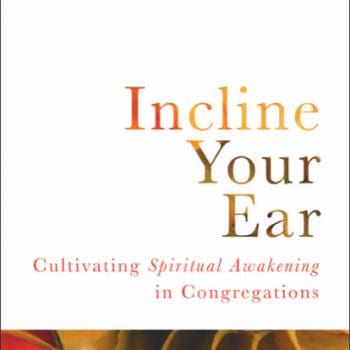 Put simply, Lent is a Christian season during which we honor the sacrifice Jesus made with a sacrifice of our own. Usually, whatever it is we let go is something that’s good for us, something that clears our heads and bodies, enabling us to feel better and find a deeper relationship with the Spirit.
Put simply, Lent is a Christian season during which we honor the sacrifice Jesus made with a sacrifice of our own. Usually, whatever it is we let go is something that’s good for us, something that clears our heads and bodies, enabling us to feel better and find a deeper relationship with the Spirit.
We can do this by giving up certain foods like meat or desserts, or replacing time watching TV with time spent in prayer. For the latter Lent practice, we can pray on our daily decisions using the Ignatian Examen.
The altered Examen in this blog focuses on discernment; it can help us to hear God’s voice in the midst of the many voices in our lives. Where is God calling us? Where in our countless thoughts is God’s voice? This is a chance to consider what we know about how God moves in our lives, decision to decision. The Examen as daily practice is an opportunity to recognize patterns that otherwise aren’t apparent, which is well within the spirit of Lent.
Intention: To seek God’s desire for us in one, or more, life situations during Lent.
The Exercise
- Preparation – Find a quiet place where you will not be disturbed as you enter this adventure with God. Have a journal on hand to write your reflections or jot down your thoughts. Light a candle and begin this process with a prayer, asking God to open your mind and heart to God’s desires. Ask for honesty of heart, and inner freedom from any destructive habits.
- Desire to follow God’s leading and Indifference to all else – Ask God to help you become indifferent to anything that is not of God. This does not mean you are uninterested in the outcome of your discernment, but it means you are willing to leave the outcome in God’s hands. If you feel you cannot find in yourself this place of “holy indifference” to the outcome, then express to God your desire to be open to God’s leading, saying something like, “Lord, help my lack of indifference.”
- Frame the question – Name the issue you wish to discern. It should be a concrete and concise question. Ones that can be answered “yes” or “no” (as in “should I start to look for another job?”) or where you can list realistic and concrete options are most helpful. Your question may change over time in discernment. Write out your question and sit with it in prayer. Pay attention to any insight, emotion or felt body sense that arises in you.
- Look at the question rationally – First, list two or three options for answering your question. Make a list of pros and cons for each option. Gauge at this point which option you are leaning toward. How does this option feel after considering the pros and cons for each option? Weigh your lists. Which pros and which cons feel more important than the others? Make a tentative choice among your options to “try on” for the next step.
- Look at your life situation – The tentative choice you made will affect the context of your life. How will this decision affect your family? Your lifestyle? How is your circle of friends affected? How does the option fit into your personal spiritual journey? What image of God pervades as you consider this issue? What is the background history of the issue under consideration? What are the facts at hand? Now that you have spent some time with this option, hold it in the light of your desire to follow God. Notice how free or unfree you feel as you imagine yourself pursuing this option. At this time, do you want to go back and consider other options? If so, do that now and proceed with a new tentative decision.
- Look at your beliefs and values – When you think about the option you have chosen, how are your personal and spiritual values honored? What “fruit of the Spirit” (Gal. 5:22) is evident ? Is the choice in accord with the biblical witness? Does this choice increase your generosity, openness to others who are different, your self-esteem? Does this choice allow you to love as Jesus loved?
- Listen to your intuition – Imagine your thoughts dropping down into the center of your being and becoming very still. Listen to your breath for a few minutes. Now, allow any images to freely emerge for you. Is any image predominate? In what way does this image relate to your option? What is your gut feeling about the option you have chosen? As you ponder your option, what is your present body language? How does your body feel? Can you identify a felt sense within your body that is related to this option? After listening to your intuition, any images or any bodily senses that emerged, do any new options emerge?
- Use your imagination – Imagine yourself living out the option you are most leaning toward at the moment. Then, imagine taking a different course. Which feels more right? More free? In which option did your body feel relaxed and energized?
- Imagine you are very old and looking back on this decision. What will you wish you had done?
- Imagine your best friend came to you with a similar question and was leaning toward a similar option. What would you advise?
- Imagine you are explaining your decision to the wisest person you know. What do you imagine they would say to you?
- Examine your consolation and desolation – As you continue to test the option you are leaning toward, examine it to see if you are feeling more consolation or desolation:
- Consolation – a mostly positive movement of the heart (even in the midst of grief or longing), an increase in faith, hope and love, inner and lasting peace, joy, an “inner knowing” that encourages, supports and enlivens your decision. Consolation generally draws you closer to God.
- Desolation – a mostly negative movement of the heart (even in the midst of good fortune or excitement), a turning away from faith, a restlessness, heaviness, anxiety, an “inner knowing” that discourages, calls into doubt or dulls the energy around your decision. Desolation generally makes you feel far from God.
- Make your decision – Based on all you have experienced in the questions and tests of this process, make a decision. Notice your immediate reaction. Is it one of consolation or desolation? You may choose to not act on it right away, testing to see if your feelings and thoughts remain the same for a few days. At some point, though, you must act on faith on the decision you have made.
- Test the decision – How does the decision feel after taking action on it? Do you have the energy to live it out? Are you feeling more consolation or desolation? Does your decision fit with the “law of love” that Jesus calls us to? How have the people in your life responded to the decision? What “Fruit of the Spirit” (Gal. 5:22) have you noticed? Do you feel closer to God or farther from God as a result of taking action on your decision? If, after testing the decision, you believe it not to be a call from God, do not panic. This is a time for ongoing discernment. Do you need to adjust your decision?
Tips
If you would rather try the more traditional Examen for Lent, please see my blog from last year on how to do it, or find another prayer in my book, “50 Ways To Pray.” Both my blog and book are full of other exercises you can try for Lent, or any other time of year.
If you find it too daunting to approach this process alone, consult a spiritual director or a friend who is wise and discerning. If you particularly want to stay with Ignatian-style discernment, find a Jesuit or Jesuit-trained spiritual director. Catholic retreat centers in your area can help you find the right person.
Discernment doesn’t have to follow a long, complex process. If you have a relatively easy question in your life that you want to decide with God, look over this process and see which questions are most helpful. Answer those and pray with those. The process is meant to be a guide and a help, not a hindrance. Make sure, though, that you follow the first two steps every time you approach God in discernment. They are the foundation of Christian spiritual discernment.
Looking for More?
Want to try spiritual direction? I have openings in my schedule for new directees — regardless of where you live. I can work by phone, Skype or if you live in the Phoenix metro area we can meet in person. Contact me at [email protected] or visit www.teresablythe.net.
Thank you for following this blog!












